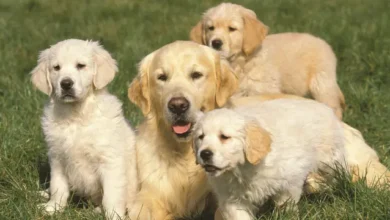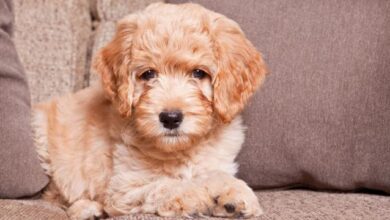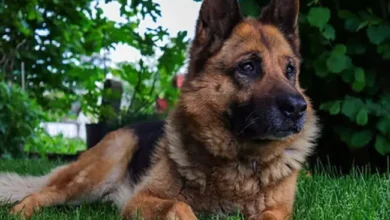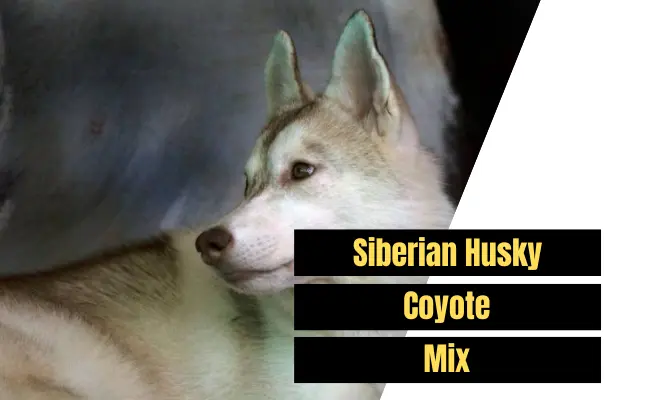
The world of canine hybrids holds a captivating enigma—the Husky Coyote mix. This unique blend of the majestic Siberian Husky and the untamed coyote combines physical traits and behavioral characteristics from both parent species. While intentionally breeding Siberian Huskies with coyotes is uncommon, the resulting Coydog offspring possess a remarkable combination of features. In this article, we embark on an informative journey to unravel the secrets of the Husky Coyote mix, shedding light on their distinct appearance, fascinating temperament, and important considerations surrounding these intriguing hybrids.
Exploring the Parent Breeds – Siberian Husky and Coyote
In our quest to understand the captivating Husky Coyote mix, it’s crucial to delve into the characteristics and traits of its parent breeds, the Siberian Husky and the Coyote. These two distinct animals bring their own unique qualities to the mix, shaping the fascinating hybrid we seek to comprehend. Let’s explore the key attributes of the Siberian Husky and the Coyote individually to gain a deeper understanding of their roles in creating the extraordinary Husky Coyote mix.
Related Post: Bernese Mountain Dog Husky Mix
The Siberian Husky
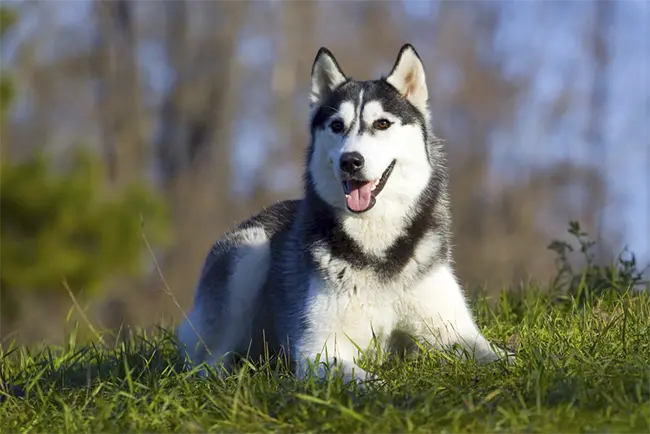
The Siberian Husky is a striking and intelligent breed known for its striking appearance and remarkable endurance. Originating from Siberia, these dogs were originally bred as working sled dogs by the Chukchi people. Here are some key characteristics of the Siberian Husky:
- Physical Traits: Siberian Huskies have a medium-sized, well-muscled body with a thick double coat that comes in a variety of colors. They have erect ears, almond-shaped eyes, and a bushy tail that curls over their back.
- Temperament: Huskies are known for their friendly and outgoing nature. They are highly social and thrive in the company of people and other dogs. They possess an independent spirit, but are also known for their loyalty and affection towards their family members.
- Energy and Exercise: Siberian Huskies are energetic and require regular exercise to keep them mentally and physically stimulated. They have a strong instinct to run, and activities such as jogging, hiking, or participating in dog sports are ideal for them.
The Coyote
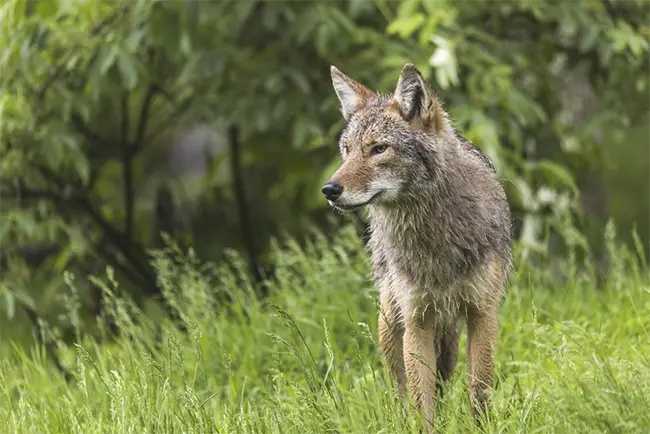
The coyote, a wild canid species native to North America, is an adaptable and resourceful creature that has adapted to various habitats. Understanding the coyote’s characteristics helps us comprehend the influence it may have on the Husky Coyote mix.
Here are some key aspects of the coyote:
- Physical Traits: Coyotes have a slender, agile body with a bushy tail and erect ears. They possess a thick, coarse coat that can vary in color from grayish-brown to reddish-brown, providing effective camouflage.
- Behavior and Adaptability: Coyotes are highly adaptable and can thrive in a variety of environments, including forests, deserts, and urban areas. They are skilled hunters and are known for their intelligence and resourcefulness when it comes to finding food and shelter.
- Social Structure: Coyotes typically exhibit a complex social structure, living in family units called packs. They communicate through vocalizations and body language, forming strong bonds within their pack.
By understanding the distinct characteristics of the Siberian Husky and the Coyote, we can better appreciate the potential influence of each parent breed on the Husky Coyote mix. This knowledge provides a foundation for comprehending the unique traits and behaviors exhibited by these captivating hybrids.
Unraveling the Coyote-Dog Mix: The Remarkable Coydog
The Coyote-Dog mix, commonly known as the “Coydog,” is an intriguing hybrid that has captivated humans for centuries. Unlike other hybrids, the Coydog offspring possess a unique fertility, enabling them to breed for up to four generations. This intentional breeding, traced back to the indigenous peoples of the Americas, had a specific purpose: to create hardier hunting companions by incorporating the bloodlines of coyotes and wolves into sled dogs. In this article, we delve into the fascinating world of the Coyote-Dog mix, exploring their initial characteristics, trainability, and the gradual transformation of their appearance over successive generations.
When it comes to first-generation Coydog puppies, they exhibit a captivating blend of the coyote’s distinct features and the mischievous nature that can make training more challenging compared to purebred dogs. However, as generations progress, these hybrids become increasingly dog-like in appearance and behavior. Join us as we unravel the enchanting journey of the Coyote-Dog mix, understanding the legacy left by indigenous peoples and the remarkable transformation of these animals over time.
Coyote Husky Mix
The Coyote Husky mix, a fascinating blend of the coyote and the Siberian Husky, has captured the curiosity of dog enthusiasts. It’s easy to understand why Native American people chose the Siberian Husky as a partner when attempting to combine domestic dogs with coyotes for sled dog improvement, as both breeds share similarities in height, build, head shape, and coat type (thick double coats) with markings ranging from white, gray, black, to brown combinations. As a result, the Coyote Husky mix boasts a striking appearance that is truly remarkable. But what about their personalities? Well, brace yourself, as these hybrids are not for the faint-hearted. Like all coyote dog mixes, Coyote Husky mixes retain their wild spirits, making them highly energetic, mischievous, and strong-willed companions. They possess a natural inclination for being comical and entertaining, often exhibiting their playful antics.
Prospective owners should be aware that the coyote dog mix requires a firm and confident pack leader to guide them. Without proper leadership, their loyalty and allegiance may shift due to their opportunistic nature and free spirit. For active individuals seeking a running partner or a dog to engage in activities like flyball, the Coyote Husky mix might be an ideal choice. Their athletic builds are perfectly suited for such endeavors, providing an outlet for their boundless energy. Join us on an exploration of the captivating traits and considerations of the Coyote Husky mix, an extraordinary hybrid that seamlessly blends the allure of the wild with the charm of a devoted companion.
Coyote Husky Mix Puppies
Coyote Husky mix puppies, also known as Coydog puppies, exhibit a fascinating blend of characteristics inherited from their coyote and Siberian Husky parentage. Let’s delve into their size, appearance, temperament, and vocalization tendencies:
Size
The size of Coyote Husky mix puppies can vary due to the genetic diversity present in each litter. On average, they tend to be medium-sized dogs, although individual puppies may lean towards either the coyote’s smaller frame or the Siberian Husky’s larger build.
Appearance
Coyote Husky mix puppies often possess a striking appearance, reflecting a blend of their parent breeds’ features. They may exhibit a combination of coat colors, including shades of white, gray, black, or brown. Their coat type is typically dense with a thick double layer, providing insulation against various weather conditions. In terms of physical structure, they may resemble the Siberian Husky in terms of body shape and facial characteristics, while also showcasing some distinct traits inherited from the coyote.
Temperament
The temperament of Coyote Husky mix puppies is an intriguing aspect to explore. These puppies inherit a unique combination of traits from both parent breeds. They are known to be highly energetic, curious, and intelligent. However, due to their wild ancestry, Coyote Husky mix puppies can also exhibit an independent and strong-willed nature. It is essential to provide them with proper socialization and training from an early age to ensure they grow up to be well-rounded and obedient companions.
Vocalization
Coyote Husky mix puppies may exhibit vocalization tendencies influenced by both the coyote and Siberian Husky. While individual puppies may vary, they generally have a propensity for vocalization. They may bark, howl, or make other distinctive vocal sounds. The specific vocal behaviors can be influenced by their environment, upbringing, and individual personalities.
It’s important to note that each Coyote Husky mix puppy is unique, and their size, appearance, temperament, and vocalization can vary among individuals within a litter. Proper care, training, and socialization play a vital role in shaping their behavior and ensuring a harmonious relationship with their human family.
Coyote Husky Mix Health
Coyote Husky mixes, like any hybrid breed, can inherit a combination of health traits from their parent breeds, the coyote and the Siberian Husky. It’s important to understand potential health considerations when considering a Coyote Husky mix as a pet. Here are some key aspects to consider regarding the health of Coyote Husky mixes:
- Genetic Diversity: One potential advantage of hybrid breeds is the increased genetic diversity they possess compared to purebred dogs. This can contribute to better overall health and reduced risk of certain inherited conditions. However, it’s crucial to remember that genetic variation can also result in unpredictable health outcomes, as some health issues may arise from either parent breed’s genetic background.
- Vigorous Health: Generally, Coyote Husky mixes are known to be hardy and resilient dogs. Their wild ancestry often contributes to their overall vitality and ability to adapt to various environments. However, individual dogs may still be susceptible to certain health conditions that can affect either the coyote or the Siberian Husky.
- Potential Health Concerns: As with any dog breed, there are some health conditions that may be more prevalent in Coyote Husky mixes. These can include hip dysplasia, eye disorders (such as cataracts or progressive retinal atrophy), and certain skin conditions. Additionally, genetic factors related to both parent breeds, such as allergies or autoimmune disorders, could potentially affect Coyote Husky mixes.
- Responsible Breeding and Health Screening: When obtaining a Coyote Husky mix puppy, it is advisable to source from a reputable breeder who prioritizes the health of their breeding dogs. Responsible breeders conduct health screenings and genetic tests on parent dogs to minimize the risk of passing on hereditary conditions to offspring.
Remember that while genetics play a role in a dog’s health, environmental factors such as nutrition, exercise, and general care also significantly impact their overall well-being. Providing a balanced diet, regular exercise, mental stimulation, and a loving, safe environment are essential for maintaining the health and happiness of any dog, including Coyote Husky mixes.
It is recommended to consult with a veterinarian experienced in working with hybrid breeds for personalized advice and guidance on the specific health considerations for your Coyote Husky mix.
Is Coyote Husky Mix a Good Pet?
Deciding whether a Coyote Husky mix is a good pet ultimately depends on several factors and individual preferences. It’s important to consider the following aspects when evaluating their suitability as a pet:
- Unique Personality: Coyote Husky mixes possess a combination of traits inherited from their coyote and Siberian Husky parents. They are known for their high energy, intelligence, and independent nature. However, their independent streak can make them more challenging to train and require an experienced and patient owner. If you are looking for a highly spirited and unique companion, a Coyote Husky mix might be a good fit.
- Energy Level and Exercise Needs: Coyote Husky mixes have significant exercise requirements due to their high energy levels. They thrive in active households with ample opportunities for physical and mental stimulation. Regular exercise, such as long walks, hikes, or engaging in activities like agility training, is essential to prevent boredom and destructive behavior.
- Socialization and Training: Early and consistent socialization and training are crucial for Coyote Husky mixes. Their independent nature can make training more challenging, requiring positive reinforcement techniques, patience, and consistency. Adequate socialization from a young age helps them develop good behavior around other animals and people.
- Strong Pack Leader: Coyote Husky mixes have a natural inclination for a strong pack leader. They require an owner who can establish clear rules, boundaries, and provide consistent leadership. Without a firm and confident pack leader, these hybrids may exhibit dominant or unruly behavior.
- Environmental Considerations: Coyote Husky mixes have a strong prey drive due to their coyote ancestry. It is important to provide them with a secure and well-fenced yard to prevent them from escaping and potentially chasing small animals. They may not be suitable for households with small pets like rabbits or cats, as their hunting instincts can be triggered.
- Legal Restrictions: It’s essential to be aware of local regulations and laws regarding owning hybrid breeds like the Coyote Husky mix. Some areas may have restrictions or special requirements due to their wild heritage.
In conclusion, the Coyote Husky mix can make a good pet for experienced and active owners who are willing to invest time, effort, and training in their care. They thrive in environments that provide mental and physical stimulation, consistent leadership, and opportunities for exercise. However, it’s important to understand their unique needs and consider individual temperament variations within this hybrid breed before making a decision.
